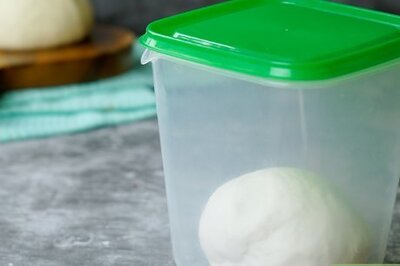
views
- Switch to high-fiber dog food, or add 1 teaspoon of psyllium husk fiber powder to your dog's food once per day.
- Consider adding probiotics to your dog’s diet, which can improve soft stools.
- Feed your dog a high-quality diet full of natural ingredients. In many cases, switching to a blander diet can help with stool issues.
- See a vet if your dog’s loose stools don’t improve or if your dog is having diarrhea.
Lifestyle Changes & Supplements

Pay closer attention to your dog and what they eat. If you’ve got a pup with a predilection for snacking on leaves and other garbage they find, catching them in the act is a good way to prevent stomach issues. Keep an eye on your dog when you’re walking them and don’t let them hang out under the dinner table when you and your family eat. If your dog is home alone during the day, consider installing baby gates to restrict them to one part of the house. Keep the floors in that area pristine, and you’ll ensure your dog doesn’t eat up anything they shouldn’t have.

Try giving your dog probiotics to see if that helps. The gut relies on a population of bacteria to aid digestion. If your dog has had a poor diet and soft stools for a while, then the bowel can get an overgrowth of "unhelpful" bacteria. Try giving your dog probiotic treats every few days to see if that helps improve things. Do not give your dog human probiotics. People and dogs have different gut biomes. There’s some evidence that probiotics won’t help a dog’s gut in every situation, so if you don’t see any improvement after a few weeks, feel free to stop the probiotics.

Add fiber to your dog's diet. Some dogs with soft stools benefit from increased fiber in their diet. Fiber helps soak up fluid like a sponge and can help normalize the feces, dry up diarrhea, or firm up stool. Either switch to a high-fiber diet or sprinkle a teaspoon of psyllium husk fiber powder in with your dog’s breakfast every day. Believe it or not, you can give your dog psyllium husk meant for humans. The most popular brand is Metamucil, but any brand will work. Just avoid the husk with sugar added to it for flavor.

Make sure your dog always has fresh water. Dogs with soft stools lose extra water because of the raised fluid content, so it is important for them to have free access to clean drinking water to replace this lost fluid. Wash and clean your dog’s water bowl at least every other day and make sure that they always have fresh, clean water. If your dog won’t drink standing water, consider upgrading to a water fountain for dogs.

Increase the amount of time between your dog’s meals. Most dogs need 6-8 hours to fully digest whatever is in their stomach. If you feed your dog at 8 am and then 3 pm, try moving dinner to 5 or 6 pm. If you feed your dog 3 times a day, try switching to 2 larger meals a day. A lot of dogs do a lot better with 2 meals a day, believe it or not.

Keep your pup as stress-free as possible. If taking a bath or hearing fireworks is stressful for your dog, wait a few days and observe if the stool firms up. In some dogs there is a strong link between stress and digestive disturbances. If this is the case, reduce their overall stress in order to firm their stools up. Stress causes the physiology of the intestines to become more basic (acidic intestines favor the good bacteria), making it harder for your dog to process foods.

Take your dog to the veterinarian if soft stool persists. While a lot of cases of soft stool can be cleared up simply through changes to diet, it can be a sign of other health problems. If your dog continues to pass soft stools, even after you have tried changing their diet, take them to a vet to get checked out.
When to See a Vet

Wait a day or so if there were recent changes to your dog’s diet. Have you recently changed your dog’s diet? Did you switch up the brand of treats, or reward them with a little piece of cheese? If so, your dog’s poop should return to normal in no time. Just monitor your dog’s behavior and stool. If things return to normal, write this off as a one-time thing. If you do want to change your dog’s diet, switch their diet gradually over time. Start with ¼ new food and ¾ the old food. Then, slowly change the ratio over time.

See a veterinarian if your dog needs treatment for diarrhea. A single instance of diarrhea followed by normal eating, drinking, and behavior is probably nothing. But if the diarrhea persists or there are any other symptoms associated with the diarrhea, you should take your dog to a vet as soon as possible. Potential symptoms that require a vet visit include: Blood, mucus, or materials that look like seeds in your dog’s stool. Vomiting, lethargy, or excessive panting. Whimpering, sudden aggression, or crouching over around their tummy. If your dog has zero additional symptoms, don't feed them for 24 hours, but make sure plenty of fresh water is available. After 24 hours, introduce a bland diet such as cooked chicken and boiled white rice.




















Comments
0 comment